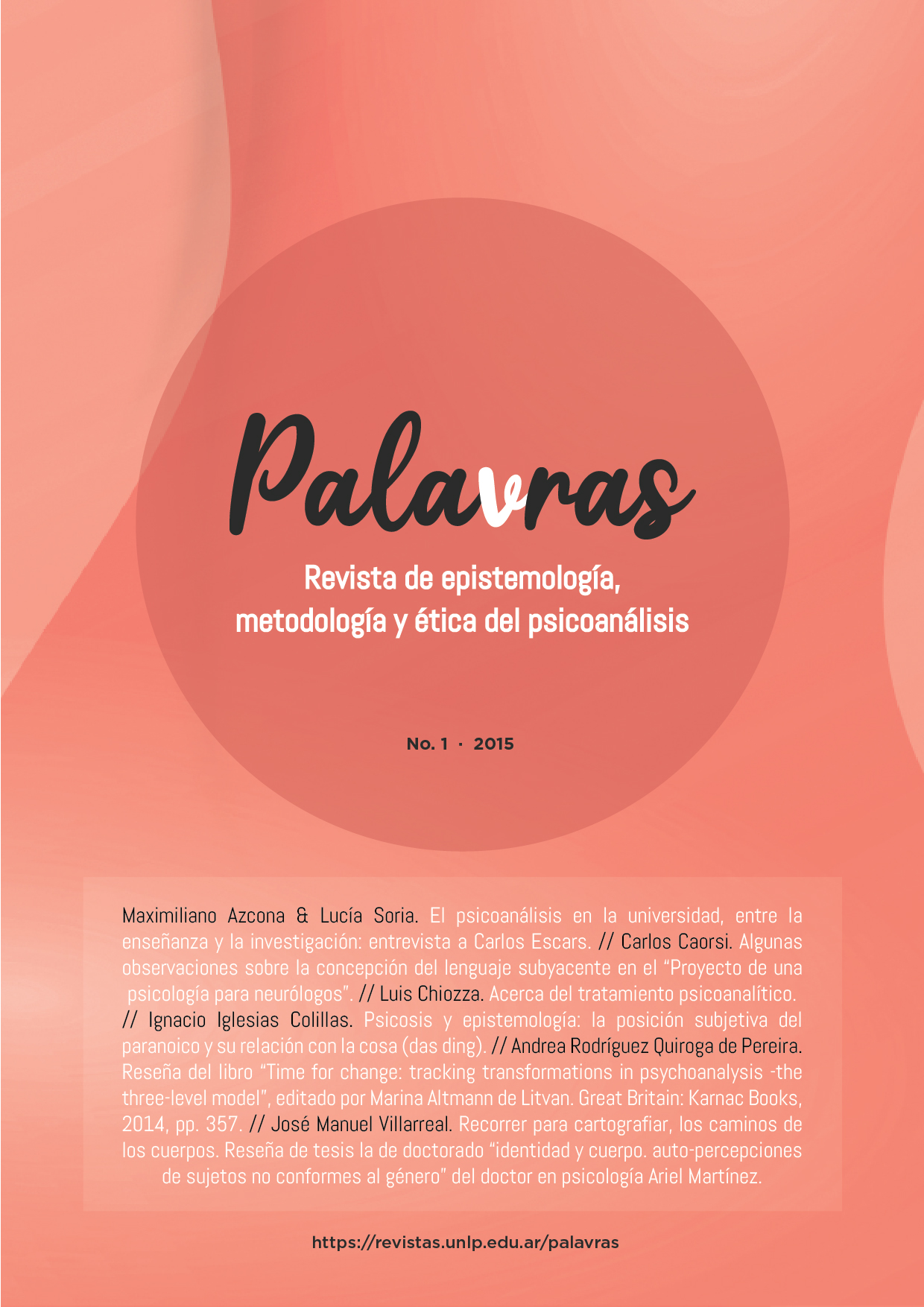Reseña del libro “Time for change: tracking transformations in psychoanalysis -the three-level model”, editado por Marina Altmann de Litvan. Great Britain: Karnac Books, 2014, pp. 357
DOI:
https://doi.org/10.24215/24689831e004Abstract
Reseña del libro “Time for change: tracking transformations in psychoanalysis -the three-level model”, editado por Marina Altmann de Litvan. Great Britain: Karnac Books, 2014, pp. 357
Downloads
Download data is not yet available.
Metrics
Metrics Loading ...
References
Blatt, S. & Ford, R. Q. (1994).Therapeutic Change. An Object Relations Perspective. New York: Plenum Press.
Bernardi, R. (2006). Fenómenos de cambio en las ideas psicoanalíticas en el Río de la Plata durante las décadas de 1960 y 1970. (Tesis inédita de doctorado). Uruguay.
Bernardi, R.; de León, B. (1992): ¿Incluimos nuestros presupuestos en la actividad de autoanálisis? Revista Uruguaya de Psicoanálisis, 76: 243-260.
DPV Katamnesestudie, Estudio de seguimiento de la Asociación psicoanalítica alemana.
Leibovich de Duarte, A., Huerín, V., Roussos, A., Rutsztein, G., & Torricelli, F., (2002). Empirical Studies on Clinical Inference: Similarities and Differences in the Clinical Work of Psychotherapists with Different Theoretical Approaches and Levels of Experience. IPA An Open Door Review of Outcome Studies in Psychoanalysis. Second Revised Edition. (pp 201-204.) London: International Psychoanalytic Association.
Leibovich de Duarte, A. (2010). Psychotherapists at work. Exploring the construction of clinical inferences. En: Ralf Schwarzer and Peter A. Frensch (ed) Personality, Human Development, and Culture: International Perspectives on Psychological Science. Cap. 3, Vol. 2, pp 29-43. Psychology Press on behalf of the International Union of Psychological Science.
Luyten, P., Blatt, S. & Corveleyn, J. (2006) Salvando la distancia entre el positivismo y la hermenéutica en la investigación psicoanalítica. Aperturas Psicoanalíticas. Hacia Modelos Integradores, 4. Recuperado de http://www.aperturas.org/24luyten.html
Wallerstein R (1978). Perspectives on psychoanalytic training around the world. Int J Psychoanal 59: 477–503.
Bernardi, R. (2006). Fenómenos de cambio en las ideas psicoanalíticas en el Río de la Plata durante las décadas de 1960 y 1970. (Tesis inédita de doctorado). Uruguay.
Bernardi, R.; de León, B. (1992): ¿Incluimos nuestros presupuestos en la actividad de autoanálisis? Revista Uruguaya de Psicoanálisis, 76: 243-260.
DPV Katamnesestudie, Estudio de seguimiento de la Asociación psicoanalítica alemana.
Leibovich de Duarte, A., Huerín, V., Roussos, A., Rutsztein, G., & Torricelli, F., (2002). Empirical Studies on Clinical Inference: Similarities and Differences in the Clinical Work of Psychotherapists with Different Theoretical Approaches and Levels of Experience. IPA An Open Door Review of Outcome Studies in Psychoanalysis. Second Revised Edition. (pp 201-204.) London: International Psychoanalytic Association.
Leibovich de Duarte, A. (2010). Psychotherapists at work. Exploring the construction of clinical inferences. En: Ralf Schwarzer and Peter A. Frensch (ed) Personality, Human Development, and Culture: International Perspectives on Psychological Science. Cap. 3, Vol. 2, pp 29-43. Psychology Press on behalf of the International Union of Psychological Science.
Luyten, P., Blatt, S. & Corveleyn, J. (2006) Salvando la distancia entre el positivismo y la hermenéutica en la investigación psicoanalítica. Aperturas Psicoanalíticas. Hacia Modelos Integradores, 4. Recuperado de http://www.aperturas.org/24luyten.html
Wallerstein R (1978). Perspectives on psychoanalytic training around the world. Int J Psychoanal 59: 477–503.
Downloads
Published
2015-09-01
Issue
Section
Reseñas
License
Attribution 4.0 International (CC BY 4.0)
You are free to:
- Share — copy and redistribute the material in any medium or format
- Adapt — remix, transform, and build upon the material for any purpose, even commercially.
The licensor cannot revoke these freedoms as long as you follow the license terms.
Under the following terms:
-
Attribution — You must give appropriate credit, provide a link to the license, and indicate if changes were made. You may do so in any reasonable manner, but not in any way that suggests the licensor endorses you or your use.
- No additional restrictions — You may not apply legal terms or technological measures that legally restrict others from doing anything the license permits.
Notices:
- You do not have to comply with the license for elements of the material in the public domain or where your use is permitted by an applicable exception or limitation.
- No warranties are given. The license may not give you all of the permissions necessary for your intended use. For example, other rights such as publicity, privacy, or moral rights may limit how you use the material.










